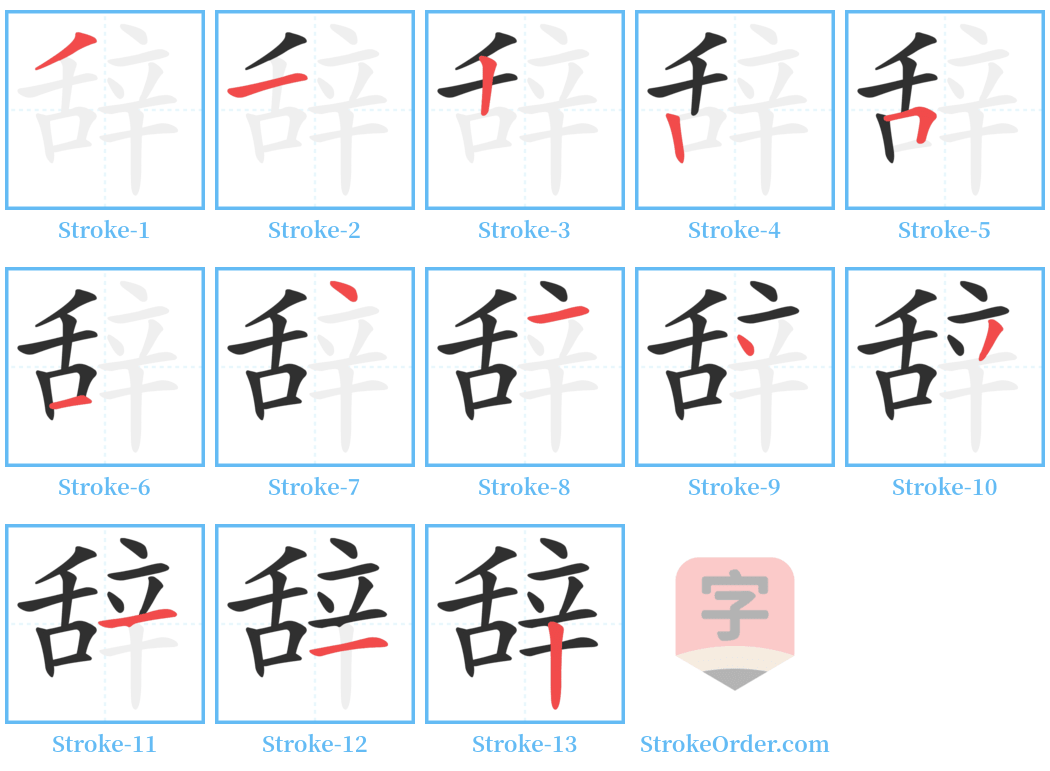辞 Stroke Order
Animated Stroke Order of 辞

Stroke Order Diagrams for 辞

Step-by-Step Handwriting Guide for 辞

Learn to Write Chinese Characters with Video Tutorials
Watch the video of writing the Chinese character "辞", learn the correct stroke order (笔顺) of the character "辞", and master the standard way of writing the character "辞".
Free Printable Handwriting Practice with Stroke Order: 辞
Printable Writing Practice Worksheet of "辞" in Portrait Orientation (Tian Zi Ge)

Printable Writing Practice Worksheet of "辞" in Landscape Orientation (Tian Zi Ge)

Information of 辞
Pinyin
cí
Radical
辛
Strokes
13 strokes
Usage
★★★★★
Definition
bid farewell / diction / resign / say goodbye / take leave / decline
辞 (cí)
1. **Farewell**:告别 (bid farewell)
2. **Refusal to accept, request to leave**: 不接受,请求离去 (decline, ask to leave)
3. **Avoidance, excuses**: 躲避,推托 (escape, evade)
4. **Dismissal**: 解雇 (to dismiss)
5. **Related to ‘词’ (cí)**: 同“词” (same as ‘word’)
6. **Elegant language**: 优美的语言 (graceful language)
7. **Speaking; to tell**: 讲话;告诉 (to speak; to inform)
8. **A literary genre**: 文体的一种 (a type of literary style)
辞 (cí) (noun)
- **Original meaning**: 诉讼 (lawsuit)
- **Meanings**:
1. Legal case (法律案件)
2. Oral confession (口供)
3. Speech; diction (言辞;文辞)
4. Specifically refers to governmental orders (政令)
5. Excuses (借口)
6. A classical Chinese literary genre, also called ‘赋’ (Ci, a type of classical Chinese literature)
7. A form of classical poetry (古体诗的一种)
辞 (cí) (verb)
1. **To speak, talk**: 说讲 (to speak)
2. **Bid farewell, say goodbye**: 辞别;告别 (say farewell)
3. **Decline, refuse**: 推却不受 (refuse to accept)
4. **To try (in a legal context)**: 审讯 (to try)
5. **To dispatch, expel**: 遣去 (to send off)
6. **To dismiss, relieve of duties**: 解雇,免职 (to dismiss)
to express in words or writing / to make a speech (esp. short introduction, vote of thanks, afterword, funeral homily etc) / to address (an audience) / same as 致詞|致词
Input Method for 辞
Pinyin
ci2
Wubi
tduh
Cangjie
hrytj
Zhengma
mise
Four Corner
20641
Unicode
U+8f9e
Same Pronunciation Characters